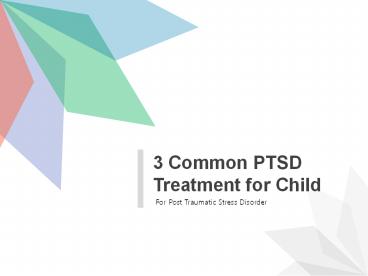3 Common PTSD Treatment for Child - PowerPoint PPT Presentation
Title:
3 Common PTSD Treatment for Child
Description:
If we talk about PTSD Treatment for Child, CPT is highly recommended and is a 12-week course of treatment, with weekly sessions of 60-90 minutes. Know more about it from our official website. – PowerPoint PPT presentation
Number of Views:39
Title: 3 Common PTSD Treatment for Child
1
3 Common PTSD Treatment for Child
For Post Traumatic Stress Disorder
2
What is Post Traumatic Stress Disorder?
- PTSD is an anxiety disorder or an abnormal
- psychological condition develops after a person
is exposed to a traumatic or painful incident. - Individuals of any age and gender can suffer PTSD
and symptoms may develop - immediately after an accident or during the
course of time. - Psychologists, therapists, or psychiatrists can
help people with PTSD deal with hurtful thoughts
and - bad feelings and get back to a normal life.
3
Cognitive Processing Therapy
- If we talk about PTSD Treatment for Child, CPT is
highly - recommended and is a 12-week course of treatment,
with weekly - sessions of 60-90 minutes.
- At first, you'll talk about the traumatic event
with your therapist and - how your thoughts related to it have affected
your life. Then you'll write in detail about what
happened. This process helps you examine how - you think about your trauma and figure out new
ways to live with it. - This type of therapy teaches ways to replace
negative, unhelpful - thoughts and feelings with more positive
thinking.
4
Prolonged Exposure Therapy
- If you've been avoiding things that remind
- you of the traumatic event, PE will help you
- confront them. It involves eight to 15 session,
usually 90 minutes each. - Early on in treatment, your therapist will teach
you breathing techniques to ease your - anxiety when you think about what happened.
- Later, you'll make a list of the things you've
- been avoiding and learn how to face them,
- one by one. In another session, you'll recount
the traumatic experience to your therapist, - then go home and listen to a recording of
- yourself.
5
Medications
- If a child is feeling severe anxiety, fear and
hopelessness, - medication can be a useful addition to her
psychotherapy for - PTSD.
- Antidepressant or anti-anxiety medications can
help the child - feel calmer, more in control and ready to apply
the coping - strategies she is learning in therapy.
- Medications help you stop thinking about and
reacting to what - happened, including having nightmares and
flashbacks. - Our Psychologist is devoted to helping children,
families and - clinicians decide whether medication might be a
useful part of - treatment.































